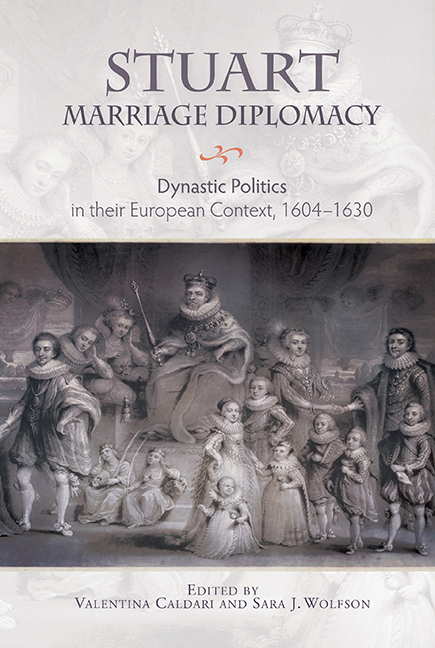Book contents
- Frontmatter
- Contents
- List of Illustrations
- List of Contributors
- Acknowledgements
- List of Abbreviations
- Introduction
- Part One Marriage and the Court
- Part Two Marriage and Politics
- Part Three Marriage and War
- Part Four Marriage and News
- Part Five Marriage and Continental Europe
- Part Six Marriage and Ceremony
- 18 Dynastic Marriage, Diplomatic Ceremonial and the Treaties of London (1604–05) and Antwerp (1609)
- 19 Spanish Architecture in Early Stuart London: Foreign Policy and Architectural Style in Inigo Jones's Queen's Chapel at St James's
- Bibliography
- Index
- Studies in Early Modern Cultural, Political and Social History
18 - Dynastic Marriage, Diplomatic Ceremonial and the Treaties of London (1604–05) and Antwerp (1609)
from Part Six - Marriage and Ceremony
Published online by Cambridge University Press: 24 October 2019
- Frontmatter
- Contents
- List of Illustrations
- List of Contributors
- Acknowledgements
- List of Abbreviations
- Introduction
- Part One Marriage and the Court
- Part Two Marriage and Politics
- Part Three Marriage and War
- Part Four Marriage and News
- Part Five Marriage and Continental Europe
- Part Six Marriage and Ceremony
- 18 Dynastic Marriage, Diplomatic Ceremonial and the Treaties of London (1604–05) and Antwerp (1609)
- 19 Spanish Architecture in Early Stuart London: Foreign Policy and Architectural Style in Inigo Jones's Queen's Chapel at St James's
- Bibliography
- Index
- Studies in Early Modern Cultural, Political and Social History
Summary
In early February 1609, the Spanish extraordinary ambassador Don Pedro de Toledo left Paris after failing spectacularly in his mandate to weaken the French government's support for the United Provinces. Don Pedro had arrived in France with a striking proposal: no less than a triple match between the Spanish branch of the house of Habsburg and the house of Bourbon. This tripartite proposal formed part of a larger set of interrelated Anglo-Spanish, Anglo-French and Franco-Spanish marriage discussions that began just after the birth of a French dauphin and Spanish infanta in 1601, continued during events celebrating the Anglo-Spanish peace treaty signed in 1604–05, and carried on via Don Pedro's embassy – eventually resulting in the royal marriages of 1615 between France and Spain and 1625 between France and England. This essay situates events leading up to Don Pedro's departure within this broader context of French, Spanish and English foreign policy considerations. Applying William Roosen's notion of ‘stroking’ via early modern diplomatic ceremonial, it also highlights some of the complex and multifaceted ways in which pre-modern diplomatic relations made use of dynastic marriage proposals.
A crucial backdrop framing Don Pedro's reception in France was Henri IV's pressing need for peace at home, after thirty-five years of civil war, in order to restore the kingdom's economic solvency and political stability. In 1598, the Treaty of Vervins had put an end to the country's longstanding war against Spain, but with this action France divided itself from England and the United Provinces, who two years earlier had signed the Treaty of Greenwich according to which all three had gained the promise of mutual military support. Thereafter, and for the remainder of Henri IV's life, France and Spain engaged in what might be called a cold war: Philip III persisted in inciting conspiracies against Henri's legitimacy and even his life, while the king of France worked behind the scenes to undermine Habsburg interests, supporting the Moriscos in a plot against the Spanish crown and aiding the United Provinces with financial subsidies and by allowing the Dutch to recruit soldiers within French territory.
- Type
- Chapter
- Information
- Stuart Marriage DiplomacyDynastic Politics in their European Context, 1604–1630, pp. 287 - 302Publisher: Boydell & BrewerPrint publication year: 2018



